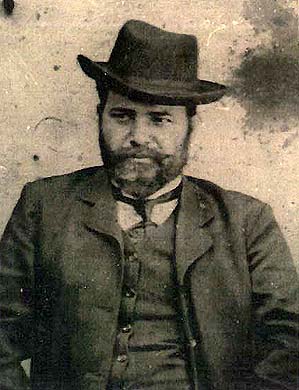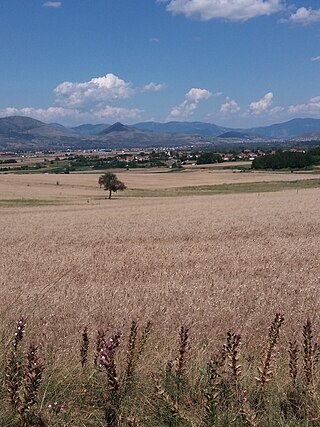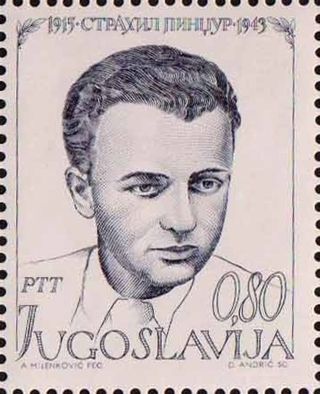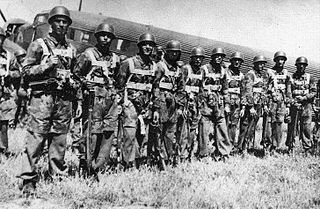
Teodos Anev or Yanev was a Bulgarian revolutionary and an activist of the Internal Macedonian Revolutionary Organization. [1]

Teodos Anev or Yanev was a Bulgarian revolutionary and an activist of the Internal Macedonian Revolutionary Organization. [1]
Teodos Yanev was born in the Kumanovo village of Malino, then in the Ottoman Empire. He joined the IMRO. During the Balkan War in 1912, he was a volunteer in the Macedonian-Edirne militia and served in the Combined Partisan Company of the IOC and 14 water companies. During the First World War he was in the ranks of the partisan detachment of the 11th Division. [2]
He died on September 14, 1915. [3]

The Internal Macedonian Revolutionary Organization, was a secret revolutionary society founded in the Ottoman territories in Europe, that operated in the late 19th and early 20th centuries.

Georgi Nikolov Delchev, known as Gotse Delchev or Goce Delčev, was an important Macedonian Bulgarian revolutionary (komitadji), active in the Ottoman-ruled Macedonia and Adrianople regions at the turn of the 20th century. He was the most prominent leader of what is known today as the Internal Macedonian Revolutionary Organization (IMRO), a secret revolutionary society that was active in Ottoman territories in the Balkans at the end of the 19th and the beginning of the 20th century. Delchev was its representative in Sofia, the capital of the Principality of Bulgaria. As such, he was also a member of the Supreme Macedonian-Adrianople Committee (SMAC), participating in the work of its governing body. He was killed in a skirmish with an Ottoman unit on the eve of the Ilinden-Preobrazhenie uprising.

The Kruševo Republic was a short-lived political entity proclaimed in 1903 by rebels from the Secret Macedonian-Adrianople Revolutionary Organization (IMRO) in Kruševo during the anti-Ottoman Ilinden–Preobrazhenie Uprising. According to subsequent Bulgarian and followed later Macedonian narratives, it was one of the first modern-day republics in the Balkans.

Hristo Tatarchev was a Macedonian Bulgarian doctor, revolutionary and one of the founders of the Internal Macedonian Revolutionary Organization (IMRO). Tatarchev authored several political journalistic works between the First and Second World War. He is considered an ethnic Macedonian in the Macedonian historiography.

Pitu Guli was an Aromanian revolutionary in Ottoman Macedonia, a local leader of what is commonly referred to as the Internal Macedonian Revolutionary Organization (IMRO). Nevertheless, Pitu Guli and his family were Bulgaromans.

Petar Poparsov or Petar Pop Arsov was a Macedonian Bulgarian revolutionary, educator and one of the founders of the Internal Macedonian Adrianople Revolutionary Organization (IMARO). He is regarded as an ethnic Macedonian by the historiography in North Macedonia.

Kalochori (Greek: Καλοχώρι, before 1926: Δοβρόλιτσα - Dovrolitsa; Macedonian Slavic: Добролишта, Bulgarian: Добролища, Добролишча in the Kostur dialect, is a small rural village, part of the municipal unit of Kastoria, Kastoria regional unit, Greece. Kalochori is also located 14 kilometers away from the city of Kastoria and 14 kilometers away from the village of Nestorio. It was a part of the former municipal unit of Mesopotamia. The village has an elevation of 721 meters above sea level.

Petar Chaulev was a Bulgarian revolutionary in Ottoman Macedonia. He was a local Bulgarian leader of the Internal Macedonian Revolutionary Organization (IMRO).

Ohrana were armed collaborationist detachments organized by the former Internal Macedonian Revolutionary Organization (IMRO) structures, composed of Bulgarians in Nazi-occupied Greek Macedonia during World War II and led by officers of the Bulgarian Army. Bulgaria was interested in acquiring Thessalonica and Western Macedonia, under Italian and German occupation and hoped to sway the allegiance of the 80,000 Slavs who lived there at the time. The appearance of Greek partisans in those areas persuaded the Axis to allow the formation of these collaborationst detachments. However, during late 1944, when the Axis appeared to be losing the war, many Bulgarian Nazi collaborators, Ohrana members and VMRO regiment volunteers fled to the opposite camp by joining the newly founded communist SNOF. The organization managed to recruit initially 1,000 up to 3,000 armed men from the Slavophone community that lived in the western part of Greek Macedonia.

World War II in Yugoslav Macedonia started with the Axis invasion of Yugoslavia in April 1941. Under the pressure of the Yugoslav Partisan movement, part of the Macedonian communists began in October 1941 a political and military campaign to resist the occupation of Vardar Macedonia. Officially, the area was called then Vardar Banovina, because the very name Macedonia was prohibited in the Kingdom of Yugoslavia. It was occupied mostly by Bulgarian, but also by German, Italian, and Albanian forces.

Strahil Pindžurov, better known by his Partisan name Strašo Pindžur was a Macedonian Partisan, active during World War II in Yugoslav Macedonia, who was later proclaimed a national hero of SFR Yugoslavia.

Vasil Hristov Chekalarov or Vasil Tcakalarov was a Bulgarian revolutionary and one of the leaders of Internal Macedonian Revolutionary Organisation in Macedonia. H. N. Brailsford described Chekalarov as the "cruel but competent general" of the Bulgarian insurgents in Macedonia. He considered the adherents of Macedonist ideas to be Grecomans.

Petar Dimitrov Angelov was a Bulgarian military officer and a revolutionary, a member of the Internal Macedonian-Adrianople Revolutionary Organization (IMARO).

Andon Lazov Yanev, nicknamed Kyoseto, was a Bulgarian revolutionary and a freedom fighter of the Internal Macedonian-Adrianople Revolutionary Organization (IMARO). Although he identified as Bulgarian, according to the historiography in North Macedonia, he was an ethnic Macedonian.

Hristo Andonov (1887–1928) was a Bulgarian revolutionary and a leader of the Internal Macedonian Revolutionary Organization (IMARO).

Petar (Pere) Naumov Toshev was a Bulgarian teacher and a revolutionary and activist of the Internal Macedonian-Adrianople Revolutionary Organization. In the historiography in North Macedonia he is considered an ethnic Macedonian revolutionary.

The Stracin–Kumanovo operation was an offensive operation conducted in 1944 by the Bulgarian Army against German forces in occupied Yugoslavia which culminated in the capture of Skopje in 1944. With the Bulgarian declaration of war on Germany on September 8, followed by Bulgarian withdrawal from the area, the German 1st Mountain Division moved north, occupied Skopje, and secured the strategic Belgrade–Nis–Salonika railroad line. On October 14, withdrawing from Greece, Army Group E faced Soviet and Bulgarian divisions advancing in Eastern Serbia and Vardar Macedonia; by November 2, the last German units left Northern Greece.

Svoboda ili smart, written in pre-1945 Bulgarian orthography: "Свобода или смърть" and before 1899: "Свобода или смъртъ", was a revolutionary slogan used during the national-liberation struggles by the Bulgarian revolutionaries, called comitadjis. The slogan was in use during the second half of the 19th and the first half of the 20th centuries.

Sotir Atanasov Yanakiev was a Bulgarian Army officer, revolutionary and voivode of the Supreme Macedonian-Adrianople Committee.

Alekso Martulkov, born as Aleksandar Ončev Martulkov, was a publicist and one of the first socialist revolutionaries from the region of Macedonia. He was a member of the Bulgarian Workers' Social Democratic Party and later the People's Federative Party and the Bulgarian Communist Party. Simultaneously, he was a member of the IMRO and subsequently the IMRO (United). He advocated for the independence of Macedonia. Martulkov was also a member of the Bulgarian Parliament, as well as the Presidium of ASNOM and the parliament of SR Macedonia. He is considered a Macedonian in the Macedonian historiography and a Bulgarian in the Bulgarian historiography.